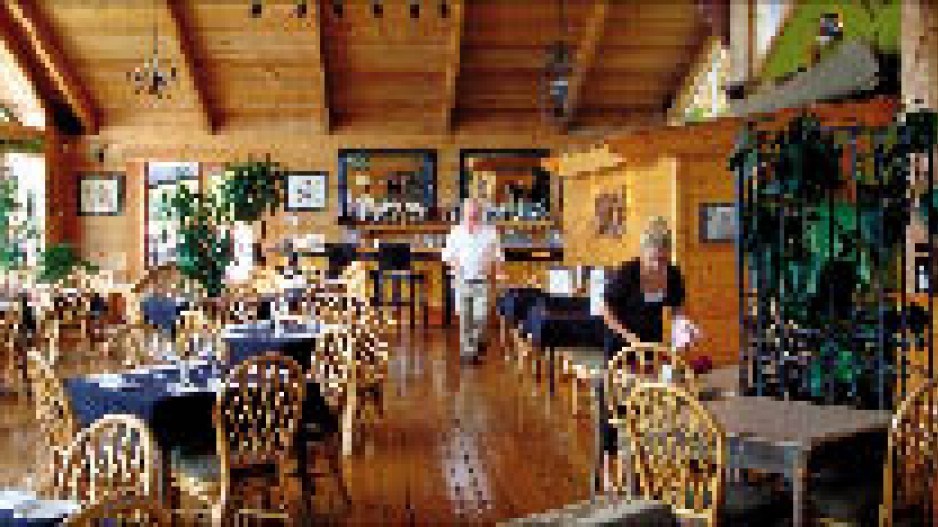In the service-driven hospitality and tourism industry, good staff can be the difference between success and failure. But in an industry with seasonally fluctuating staffing needs and a reputation for high turnover, companies need clear strategies to attract and retain the employees that will drive their success.
Cori Maedel, CEO of HR consulting firm the Jouta Performance Group, said the cost of high turnover is ?huge? for the hospitality industry. Besides costs associated with hiring and training, she said, turnover hurts service levels.
?The more turnover you have, the more training you have to do, the more uncertain it is for me as a client,? she said. ?When I walk in and I expect a certain level of service and all of a sudden you?ve got somebody green that hasn?t been trained and hasn?t been invested in, I?m not going to want to come back.?
West Coast Wilderness Lodge on the Sunshine Coast faces the challenge of a highly seasonal business. The lodge employs approximately 35 staff between May and mid-October, then scales back to a team of seven or eight for a functions-based low season.
Yet lodge owner Paul Hansen said he?s managed to keep turnover to a minimum, with only six new faces amongst his high-season staff this year. That consistency of staff, he said, drives service levels and thus business growth.
?When you have a nucleus of staff who know their job and are excited about doing good jobs, they make it very difficult for somebody who isn?t on the same page,? he said. ?They tune up the staff: ?This is how things are done here.? They?re mentors. They lead. And so our young junior staff that come on as breakfast waiters or gardeners or housekeepers – they have great role models to follow and they learn an awful lot.?
How has Hansen kept his staff coming back?
?Providing a person with an opportunity to grow as an individual and as an employee, and to feel part of the success in the overall business growth – I think those are really key ingredients for people to return,? he said.
He noted that with only a short corporate ladder, he keeps employees engaged by keeping the company growing and evolving – such as a successful push for international clientele that has taken the lodge to capacity and is necessitating a 16-room expansion.
?If you have no growth and no evolution in your business, then there?s very little incentive or excitement for your staff to stay because they get bored too,? he said.
Hansen added that while compensation at the lodge is pretty standard for the industry, he pays slightly higher-than-norm wages for entry-level positions such as housekeeping and waitstaff.
?They?re the key people, they?re the people that your visitors really interact with and [who] make a first impression, so they?re just as important as your chef. So we pay a little higher.?
Nicholas Gandossi, general manager of Opus Hotel in Vancouver?s downtown core, said the hotel has a strong retention rate, and still has 27% of the staff it opened shop with nine years ago. That staff consistency, he said, has been a key boon to the hotel.
?It?s everything. It?s our brand,? he said. ?When you have people that have seen the complete evolution of how we?ve become who we are, you can?t put that into a book or a training manual.?
Gandossi said that as a boutique hotel in the downtown core, Opus doesn?t have the dramatic ?pendulum swings? in staffing of larger downtown players or seasonal resorts. But he said staff levels do fluctuate somewhat, and the biggest retention challenge is how to keep part-time or seasonal staff coming back.
His strategy for retaining those employees?
?It sounds kind of corny but it?s that family atmosphere,? he said. ?I truly believe in it. I?m of the mindset that if you put people in the right culture and in an environment that they have fun in and enjoy and with people they trust, that?s when great things happen and that?s when you accomplish good things.?
Pulling that off, Gandossi said, involves careful hiring and then fostering positive company culture through team-building events, such as summer and winter parties. He added that the hotel also uses incentive programs to engage staff in driving the company?s profitability.
Maedel said basic retention strategies for the hospitality industry include:
?creating an employee handbook that explains what the company is about and what it?s trying to achieve;
?creating opportunities for employees to learn and grow; and
?creating incentives to recognize performance.
To tackle the specific challenge of getting seasonal staff to return, Maedel said employers need to focus on treating them as well as they treat their permanent staff.
?If you can honour employees, even if they?re hourly and even if they?re temporary, in the same sense as you would a permanent, there?s a better likelihood that they?ll do great for you while they?re there – and that they?ll come back.?
She added that hotels and restaurants can also up their chances of landing returning seasonal staff by following up with them by e-mail during the off season.
?Keep in touch,? she said. ?Once a month or once a quarter - just saying ?Hey, just checking in with you, hoping you?re still going to consider working with us in December.? If I got a random e-mail from somebody like that I?d go, ?Wow, that?s cool – they actually think I?m good.?? ?




